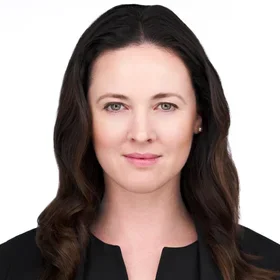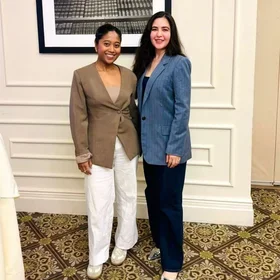“Take risks and venture outside of your comfort zone.” This is the main piece of advice from Caroline Moynihan, a recent graduate of the Columbia University School of Professional Studies M.S. in Enterprise Risk Management (ERM) program.
Coming from a risk management professional, this may seem like an obvious point. But for Caroline, who, like many others, faced uncertainty in choosing her specific career path, the ability to try new things and adapt was crucial in getting to where she is now.
Currently a risk specialist at Brown Brothers Harriman, Caroline is eager to apply the skills and knowledge she gained during her time at SPS to her role in the industry. In a recent conversation, she reflected on her career path and shared the most valuable lessons she learned at Columbia SPS.
What did you study as an undergraduate and how did this lead to your master's at Columbia?
I went to Middlebury College in Vermont and double majored in economics and French. While at college, I interned with the company I work for now, Brown Brothers Harriman (BBH), in their private banking division. After my internship, I had an offer to return full-time once I graduated.
I started my career in wealth management and interacted with the risk teams very early on, even though I was on the business side. During this time, I learned much about what the risk teams were doing and their processes.
After three years in wealth management, I moved into risk management at my company, focusing on operational due diligence. After this, I took on a role focusing more on internal operational risk. I wanted to supplement my new role in risk management with formal education. I saw the program at Columbia and thought it was perfect for me.
How did the program impact your career?
As a risk professional, it is essential to explain to people where we are coming from so they don't think of risk activities as a tick-in-the-box. The capstone module was great as we interviewed individuals who role-played executives at Yum! Brands. The interview practice in a safe setting was really helpful, as we received feedback that we could then use in the workplace. This is something I've hugely benefited from.
What was one memorable class or lecturer you had in the ERM program?
IT Risk Management was one that I really learned a lot from. There is so much that happens in IT, and some parts of my job touch it briefly. It's rapidly changing, and it was great to learn about what's going on now and how it could change. IT risk comes up very quickly in conversations with business stakeholders. It's good to have a basis of understanding for this.
What's the best professional advice you ever got that's stayed with you?
Early in my career, the advice I received that was extremely helpful was figuring out how to make the best use of people's time. To make the most of conversations, apply critical thinking and look for three questions you want to ask. The first question gets to the high-level detail, and the other two drill down and understand what's going on. This advice is a highly practical way to think about and work through situations and get the necessary information to help with decision-making.
What academic or professional accomplishment are you most proud of and why?
After I transitioned into the risk team at BBH, I realized that this was an area I really liked and wanted to pursue longer term as my career. My manager and I helped build a risk rotational program at BBH. The program takes junior talent and allows them to rotate around the different risk teams at BBH over two years. I am immensely proud of having helped establish this program, as it's really rewarding to see people learning about risk early in their careers. It's also a great way to highlight to junior talent all the different things they can do across BBH.
What advice would you give to prospective students?
Take a course you don't know anything about, and present something new you are learning about. Columbia will offer you incredible opportunities to do those things. There are professors who will help guide you and classmates who will learn alongside you.
Learn to manage your time well. It can be challenging to balance both work and school. Find a course load that works for you, and give yourself time to rest by figuring out how to stay ahead.
About the Program
The Master of Science in Enterprise Risk Management (ERM) program at Columbia University prepares graduates to inform better risk-reward decisions by providing a complete, robust, and integrated picture of both upside and downside volatility across an entire enterprise. For both the full-time and part-time options, students may take all their courses on Columbia’s New York City campus or choose the synchronous online class experience.
Fall 2025 application deadlines for the M.S. in ERM program are March 15, 2025 for applicants with international documents, and May 1, 2025 for the final deadline. Learn more here.


